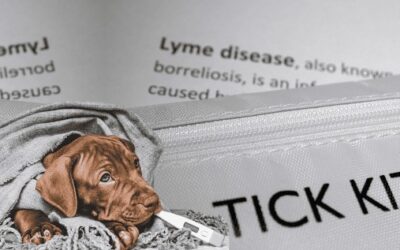Hematoma in Dogs Ear [Causes, Diagnosis & Treatment]

If you’ve noticed unusual swelling on your dog’s ear, it could be an ear hematoma, a collection of blood that gathers between the cartilage and skin of the ear flap. Also known as an “aural hematoma,” this condition can cause noticeable discomfort for your pet, but it can be managed and treated effectively with the right care.
What Causes an Ear Hematoma?
Several factors can lead to hematomas in a dog’s ear, and understanding these can help you identify potential triggers:
- Injury or Trauma: Excessive head shaking or scratching due to ear irritation can sometimes cause blood vessels to burst, leading to a hematoma.
- Ear Infections: Bacterial or yeast infections can irritate the ear canal, encouraging your dog to shake its head or scratch, which can ultimately cause hematomas.
- Allergies and Ear Shape: Allergies or naturally floppy ears in certain breeds can also contribute to inflammation and discomfort, increasing the risk of a hematoma.
- Blood Clotting Disorders: In rarer cases, a dog’s underlying health condition may affect blood clotting, making them more susceptible to hematomas.
Recognizing the Signs of an Ear Hematoma
One of the first signs of a hematoma is a swollen, distorted ear flap, which may feel warm to the touch. Other symptoms include:
- Discomfort when the ear is touched
- Head shaking or frequent ear scratching
- Redness and tenderness in the affected ear
- In some cases, a mild discharge or odor if infection is present
:strip_icc():format(webp)/Ear-flap-is-swollen-after-infection-3384926-FINAL-9357332df446448389b77378c035c187.png) Source: The Spruce / Madelyn Goodnight
Source: The Spruce / Madelyn Goodnight
Diagnosing and Treating an Ear Hematoma
As veterinaries from Small Door Veterinary explained:
“The hematoma itself is easily identifiable and not difficult for a veterinarian to diagnose by visual examination. What’s more important when determining treatment is understanding what caused the hematoma in the first place.
So the next step after a physical exam is to focus on the reason behind the head-shaking and/or scratching. The initial evaluation may include, but is not limited to, the following tests:
- Needle aspiration, which will confirm that the fluid in the pocket is blood.
- Routine blood work
- Urine test
- Examination of the ear canal to check for signs of infection, parasites, and/or foreign bodies lodged in the ear canal. This exam will include taking a swab from the ear canal and looking under a microscope for bacteria and yeast (which is referred to as cytology).
- Food trials/skin tests to identify food or other allergies that can cause discomfort. This can be a bit trickier than simply examining samples under a microscope; some trial and error may be required to identify the allergen. Additional allergy testing may need to be conducted.”
Why Timely Treatment Matters?
Addressing a hematoma early can prevent complications such as:
- Ear Deformity: Without treatment, the accumulated blood may harden, causing a permanent “cauliflower” ear appearance.
- Risk of Infection: Untreated hematomas can create a breeding ground for bacteria, potentially leading to infection.
- Increased Pain: As the swelling grows, it can become increasingly uncomfortable for your dog, affecting their overall quality of life.
Can You Treat an Ear Hematoma at Home?
Dr. Whittenburg says, as explained in the article from American Kennel Club: “A small ear hematoma may resolve on its own. In such cases, the hematoma would get reabsorbed into the body. Still, it is imperative to treat the underlying cause, or it will recur. Large ear hematomas shouldn’t be left untreated since they can be painful for your dog. Your dog can also cause further injury to themselves if they shake their head too forcefully.”
Also, Dr. Simon, stated in the same article, is against treating an aural hematoma at home; she says: “You can, however, prevent further trauma by protecting the ear with a buster collar. Cleaning out wax or debris with an ear cleaner and keeping the ear dry can also help reduce your dog’s discomfort. Following treatment, the vet will provide you with a discharge sheet outlining which medications to give and for how long, as well as guidance on using a pressure bandage or buster collar.”
Treatment Costs and Options
Treatment costs for ear hematomas can range between $300 and $2,500 based on the severity of the condition and the chosen method based on the 2023 guide written by Forbes Advisor Aaliyah Pasols for Nasdaq.
When to Seek Veterinary Care?
If your dog has a hematoma causing severe swelling, signs of infection, or any pain affecting their behavior, it’s best to seek professional treatment. Persistent or recurring hematomas can indicate an underlying issue that needs to be addressed.
Preventing Future Hematomas
To help minimize the chances of a hematoma recurring, here are some helpful tips:
- Regular Ear Care: Keep your dog’s ears clean and free of excess wax and debris.
- Manage Allergies and Infections: Address allergy triggers and treat any infections promptly to prevent excessive head shaking.
- Routine Vet Check-Ups: Regular check-ups can catch potential issues early and ensure your dog’s ear health is in top shape.
How Can Pet Insurance Help You if Your Dog Needs a Treatment?
Pet insurance can be a valuable tool in managing the costs of treating a dog’s veterinary expenses. By having a pet insurance policy in place, you can have peace of mind knowing that you can provide medical care for your furry companion without worrying about the financial burden. Pet insurance can help cover the costs of veterinary consultations, diagnostic tests, medications, and even specialized treatments if required.
Reimbursement
This method is the most common for pet insurance companies. You pay out of pocket for the veterinarian bill, and then the insurance company reimburses you for what’s covered under the insurance plan. The steps look like this.
- You pay the vet bill after your dog’s visit.
- You fill out the pet insurance claim form.
- Submit the claim form and other required documentation to the insurer.
- After the claim is approved, you will be reimbursed for eligible expenses.
What Does Odie Pet Insurance Cover?
Pet insurance covers various veterinary expenses, providing financial protection and peace of mind for pet owners. Here are the details of the coverage options offered by Odie Pet Insurance:
Illness & Injury Plan
The Illness & Injury Plan is an all-inclusive insurance plan designed to cover a wide range of medical needs for your pet. This plan includes comprehensive coverage for various illnesses, injuries, and veterinary services. Some of the covered items include:
- Veterinary exams and consultations
- Diagnostics (e.g., X-rays, lab tests)
- Prescribed medications
- Surgeries and hospitalization
- Rehabilitation, acupuncture, or chiropractic treatments
- Medically necessary supplies
- Euthanasia and cremation
The Wellness Plan
The Wellness Plan is a monthly membership that focuses on preventive care and covers routine veterinary services.
- Provides reimbursements for routine care items such as wellness visits (exams and vaccines), testing and parasite prevention, dental cleanings and at-home dental care, vitamins, supplements, and more.
- Through Odie’s partnership with Petivity, a leader in smart pet products and proactive care, Wellness Plan members can also receive reimbursements for Petivity devices and health kits, as well as eligible Purina food and supplements.
- Total reimbursement up to $700 per year.



